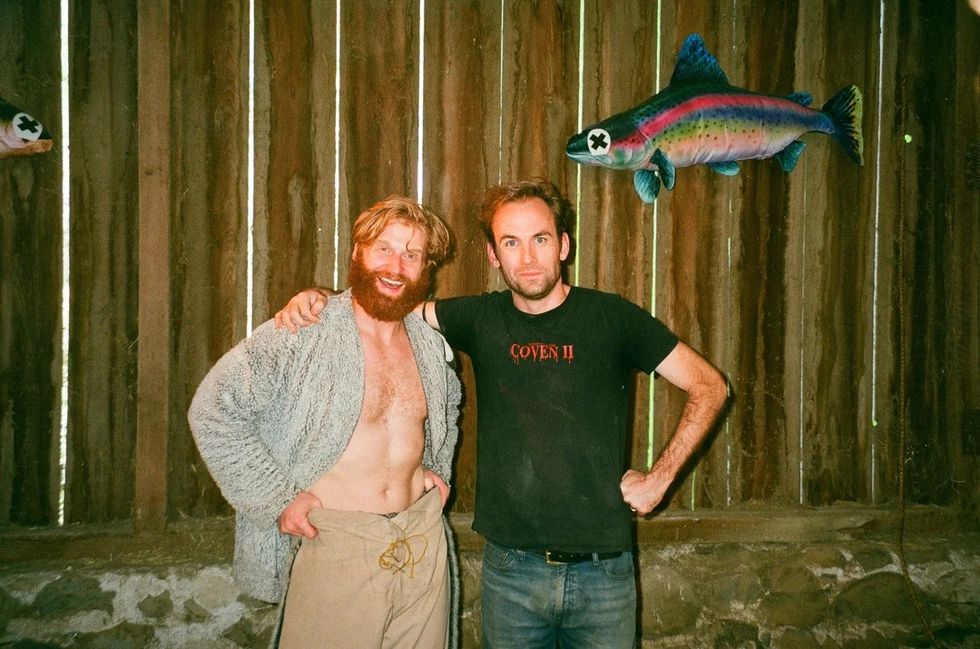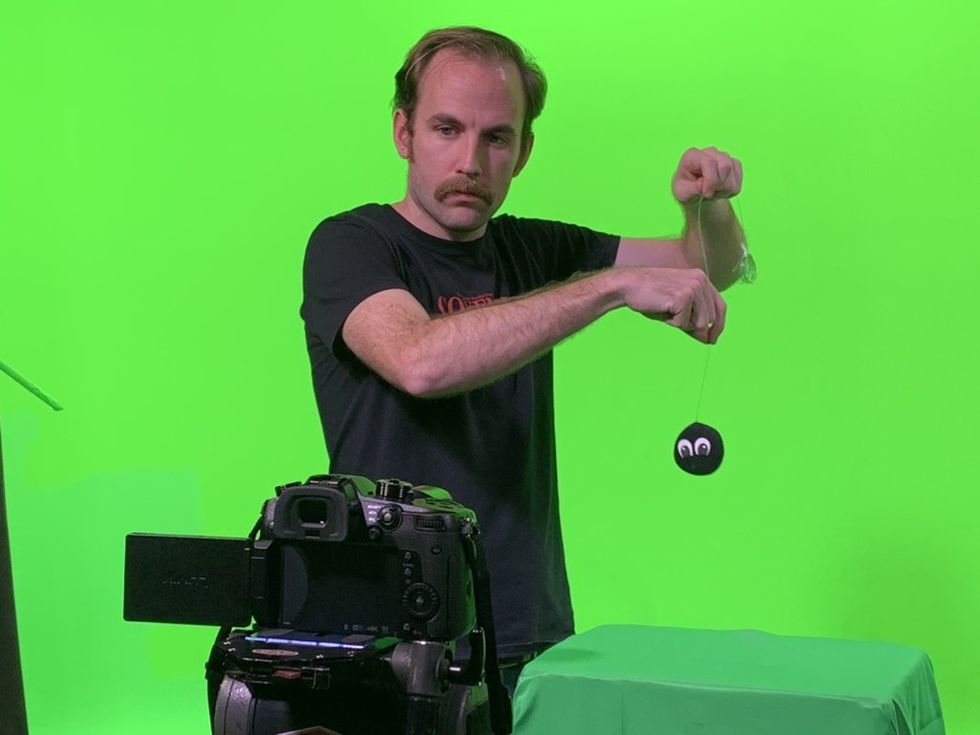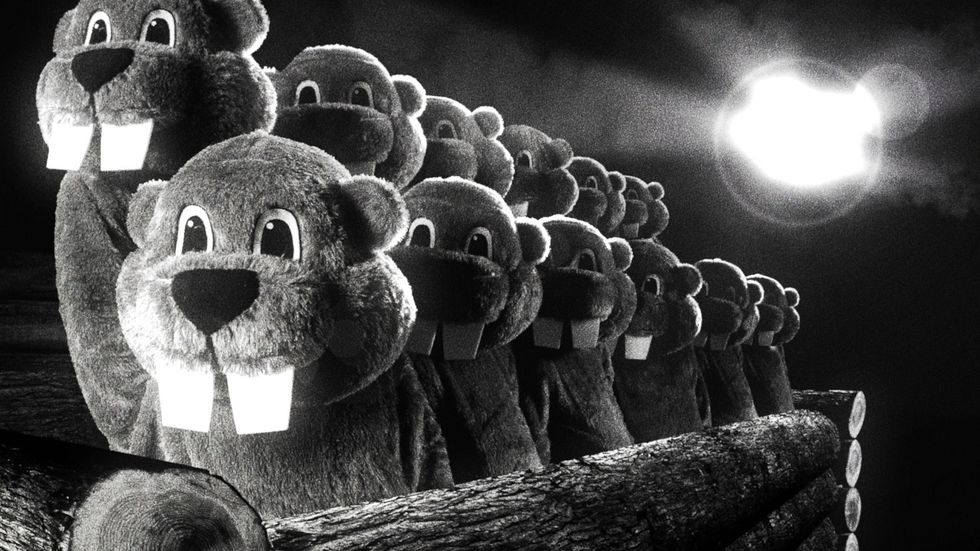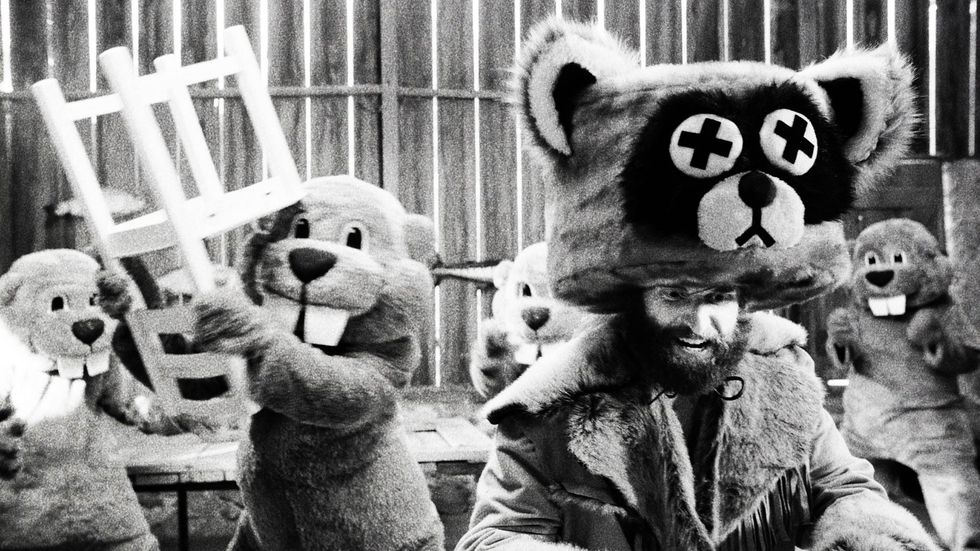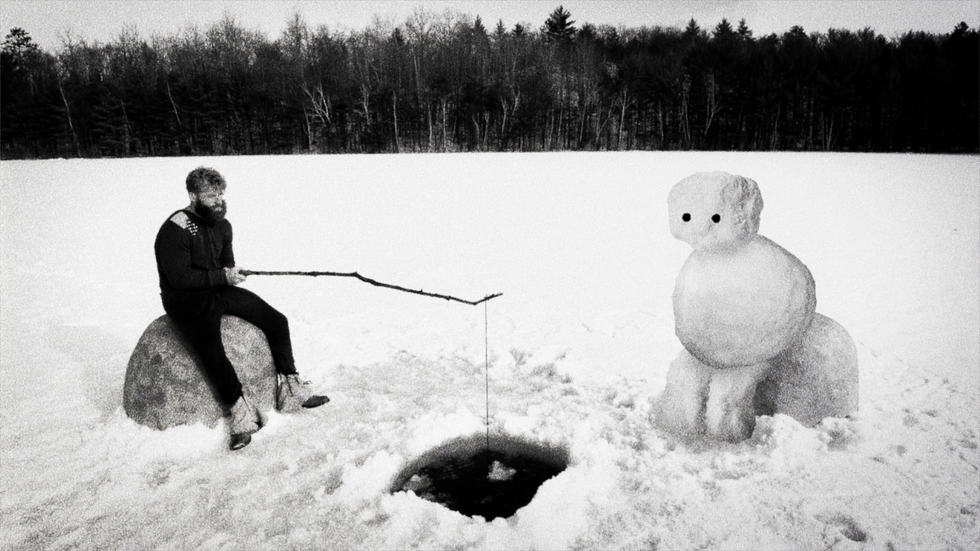Using the Camera as an Insidious Agent: Joe Martin’s F*ck You, Punk Rock 'Us and Them'
"I thought it'd be cool if I could set up a scene, and then another scene that totally re-contextualizes the first scene so you'd see it in a completely different way."

In his feature debut Us and Them, filmmaker Joseph Martin claws at the discontentment of people marginalized by inequality in a blithely comedic style anchored by Jack Roth, whose character wants to start a class revolution by taking a family of wealthy pricks hostage, and filming the outcome. Joe Martin first sat down with No Film School after the film’s premiere at SXSW 2017; now, Martin is back in Austin in conjunction with The Orchard, which is releasing the film in theatres and on Netflix. Before you catch the film, step into our conversation where Martin covers being an average Joe in an upper crust industry, writing a script that goes beyond headlines, and making a low-budget manifesto that requires being very bold.
NFS: How did you come up with the premise for Us and Them, and how did that fit in with your impression of the political climate in England?
Joe Martin: I come from a kind of normal working class background, and I was working in film. I was trying to start working on projects in film, and try to get my stuff made. I was finding that, at least in England, a lot of the people involved in the film industry are very upper crust. From very wealthy backgrounds, and stuff.
NFS: Similar here in the States, there's definitely a lot of people who enter the film industry from affluent backgrounds.
Martin: We got a similar thing, right? I just became quite aware that were two different worlds, and how much a divide there was. We were almost existing in different realities. England had some things going on with riots, and I felt a sense of uneasiness. Tension. I think that since the [economic] crash, we haven't actually fixed any of these problems. They've just become more entrenched. Wages haven't gone up, really, for ten years when you adjust for inflation. Job security has gone down. House prices continue to rise, but obviously that only helps you if you've got a house. Rent's sort of ridiculous now.
It was this feeling you get that all these frustrations boil over at some point, and it's something I wanted to explore in a film. We did it all before Trump, and Brexit. We'd shot it all by then, but it was the feeling that that was going to happen. You can't just ignore people forever without it getting quite explosive. We know that from our history. I think when people watch it in context, it's about the feelings that lead to these things. What the main character in this film does is different, but it's not that different to someone who votes Brexit. Who votes out, or votes Trump because they're just rolling the dice. It's that same kind of release of pressure valve.

“It was this feeling you get that all these frustrations boil over at some point.”
NFS: So you have this idea that you want to tap into. The film itself is complicated, going back and forth in stream of consciousness-style tangents. What was the process like writing the script?
Martin: I had a really good friend who was a very talented filmmaker. He got involved on the wrong side of the law when he was younger, but he turned his life around. He went to film school. We'd worked together. He had won awards, and he's a really talented guy. After graduating uni, he couldn’t get a job. There was sort of a credit crunch. None of us could get a job. He had nothing to fall back on, so he ended up going back to drugs, and took a bad batch of pills and he died.
NFS: That’s terrible.
Martin: I read in his local paper what they'd said about him. It felt like there wasn't any context to his story. It was just, guy takes drugs. Dies. Please avoid certain pills in the area. You know, that kind of thing? It was writing him off as a junkie. You need to re-contextualize his story, and I don't think we do that enough with each other. We just look at the headline. We don't necessarily think, what's led that person to that point? I think that's because we'd rather believe we're all superior to someone else in some way, rather than believe, actually, we're all just equal and therefore similar. There's not much between any human being and another. We're all capable of great things. We're all capable of terrible things.
I guess part of that writing process was I thought it'd be cool if I could set something up, a scene, and then another scene that totally re-contextualizes the first scene so you'd see it in a completely different way. So we do that again and again. We even mirror the same shots. The shot where he's pulling in, during the first bit, in the house. In the flat we do the same thing, and the meaning changes. We’re mirroring throughout. We re-contextualize imagery. You don't know which way is up. When you do low budget stuff, you need to be quite bold.

“You need to re-contextualize his story, and I don't think we do that enough with each other. We just look at the headline.”
NFS: How did you communicate to your DP how you wanted the visual strategy to go bold?
Martin: I was working with a guy who I've known since film school, so our working relationship was really familiar. I went and dropped storyboards, and we went through the script together again and again and talked about it. The idea was that Danny as a character, who feels so frustrated, also feels incredibly, almost like a persecution complex. So the camera is almost meant to persecute him. It's constantly pushing in on him as if it's prodding him, or interrogating him, just going, "What you doing? What you doing?" Other times when he's talking in the pub, you would try to cage him in. There are loads of moments where we move around him like we're caging him in. It's meant to constantly restrict him in that way. Every now and then we’d jump back. We’d go back to super wide. I almost see it as a stream of consciousness that the camera is doing that for you. Then every now and then it will pull back like, "What do you really think about this?"
That was the visual approach. We kept it lightweight. We had a Steadicam. We didn't have a fuck load of lenses. We were shooting a tight schedule. We wanted a zoom, I love zooms. But it also meant we might, instead of having loads and loads of lenses, constantly changing in and out, instead get a really good zoom, and just do our thing with that.
“The camera is almost meant to persecute him. It's constantly pushing in on him as if it's prodding him, or interrogating him.”
NFS: What were you shooting on?
Martin: We shot Alexa. It's cool. And then we shot on the Angenieux Optimum lenses. Which are nice lenses. We had six, seven locations, and we shot it in twenty days. We just didn't get a lot of coverage. I just had to know in my head how I wanted it to knit together, and be ballsy with it. I mean that can go horribly wrong. I'm not advocating for it, but we just committed to a style and we just went for it. It was a fucking stressful shoot. You know what I mean? It's quite demanding. I think when you work in docs as well, like I know you’ve worked on docs—
NFS: We share a doc background.
Martin: In documentaries, it can be quite common, as you know, that you go out for a shoot, you think you're going to be there for an hour, and then something crazy happens and you don't sleep for forty-eight hours. Say we were having a meeting with a guy, and they’re like, "Oh my god, it's Oakley. We love Oakley."
NFS: It's usually what people say when I show up.
Martin: Of course, right? But then if you're shooting it as it happens, you're like, well I've gotta get my t-shot, and I've gotta get my that—and you try to listen as well because you don't want to lose the key audio. You're trying to be hyperaware. I think that kind of run-and-gun thing in documentary can make you very effective as a director, because your mind is already always thinking three, four shots ahead. If something changes, you know in your head, "I can do this." It tightens up your game. Do you agree?
NFS: It makes a lot of sense, because being in this extended period of hyperawareness, and trying to think into the future, you learn to recognize what you’ll need in the editing.
Martin: That's right. Docs, you can shoot them any way, but you know once you've sat through sixty hours of doc footage rushes and you can't cut any of it together, you realize exactly what you need to make it work. I love the economy, the frugality of the storytelling in documentary. When you realize you're doing that with filmmaking as well, you're like, "Oh, you actually don't need to cover all that. You can have that and that and put that together and that's going to make sense."

“I think that kind of run-and-gun thing in documentary can make you very effective as a director, because your mind is already always thinking three, four shots ahead.”
NFS: Editing yourself, was there any point at which you had to get creative to rethink the story, or take a step back?
Martin: I don't think it would work on every film. This film, the whole way through, feels like a real kind of provocative fuck you, punk rock track of a film. That was the idea, and I think we deliver that.
I'm going to sound like a twat, but I think there was a pureness of vision that made a lot of sense for me to edit. To be honest, I loved it. I said, "Look, I'm going to cut it." The response was like, "Really?" I was like, "Yeah I'm going to cut it." Because I know exactly the tone and the rhythm that we need, but I'm not going to cut it quick, fuck that. There are definitely moments where you lose the perspective, and maybe you need to just step away for a few days. You can do that. So many times you get into an edit, you find it on TV stuff, and you cut it. There's an edit you do that works. There's another edit that makes it good. It's a different thing, right? Just because this all works, doesn't mean you've actually used the editing to create additional meaning. You have to use the editing to create additional feeling.
“I'm going to sound like a twat, but I think there was a pureness of vision that made a lot of sense for me to edit.”
NFS: What would be your best piece of advice for other filmmakers with a background perhaps similar to your own?
Martin: For people from just normal backgrounds just trying to get stuff made?
NFS: Yes.
Martin: Embrace your uniqueness. If you're a filmmaker from any kind of background that's a bit different, or if you want to do something different, embrace your uniqueness. Ultimately that's something only you can do which in itself is valuable. People will respond to your uniqueness, and chances are that there's someone else like you who also wants to see those kinds of films made. Don't see uniqueness as a problem. It's a virtue. If you feel like you don't quite fit in with the industry around you, then don't worry about it because that's a good thing.

